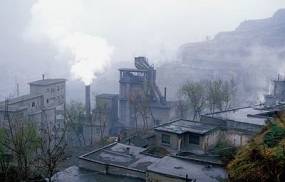Been working so much I haven’t had two seconds to put together a coherent thought. So here are a few disjointed ones.
***
I’ve got to believe the biggest unreached people group in the United States right now are those folks who are losing (or have lost) their homes to foreclosure.
***
Definition of a Christian oxymoron? This. Seriously, watch the first part—and pray your head doesn’t explode. All I can say is, “Maybe there’s hope yet!” (HT: Bud, who also has the transcript.)
***
I noted last week that many economics experts claim that China needs to create 24 million NEW jobs each year or else their economy will implode. Guess what? Riots over increasing unemployment swirl there now. No way that 24 million is happening.
And what is the standard tactic for communist regimes that hope to get the unwashed masses focusing on something else rather than regime change? Can you say, “International incident?” I knew you could. Now, what spicy, international incident can Red China cook up? (Hint: think the letter “T” and a name that rhymes with “hang my neck.”)
***
Because we could not find a taker for our dog, Rosebud, we had to take her to a no-kill shelter run by the League for Animal Welfare. It’s a beautiful facility, spotlessly clean, and is run by people who really care for animals. They’re choosy about he animals they take, so we were blessed to get her in there.
I was so broken up, I think I cried the entire time I was there. Me, 46-year-old male, 6 feet, 4 inches, and 200 pounds. A big sobbing mess. And I’m the one who said no to a dog in the first place.
The rep there said that she should go fast considering how nice she is, her age, the fact she’s spayed, and that she has all her shots. Still, it’s sad. I loathe making commitments then having my hand forced due to circumstances beyond my control. Yet that happens so many times anymore that it’s practically a rule.
***
Been to the toy section of the store? That big hole in every store in America is supposed to be filled with Bakugan. Guess the only toy my son asked for this Christmas? (Santa Claus wouldn’t have this stock problem.)
***
To which Julie puts all such thinking into perspective.
***
Was reading through Genesis with some brothers, and I read this in 16:11-12:
The angel of the Lord also said to [Hagar]:
“You are now with child and you will have a son. You shall name him Ishmael, for the Lord has heard of your misery. He will be a wild donkey of a man; his hand will be against everyone and everyone’s hand against him, and he will live in hostility toward all his brothers.
You want to understand the Arabic people? There it is in a nutshell, folks.
***
Bar none, this is the best financial blog on the Web.
***
The Christian community needs to rethink its interactions with the homosexual community. The rhetoric between both groups resembles the snarling of two rival packs of wolves. But can we Christians see Jesus, who ate with tax collectors and prostitutes and who took a thief with Him into paradise, acting that way?
It seems to me that if Christians want to really impact the homosexual community, that impact will come when we leave the pack and reach out to one homosexual man or woman at a time and show them the real love of Jesus. One-to-one. Not pack to pack.
All the snarling in the world won’t change a single life for Jesus Christ. But genuine love and concern will when demonstrated one person to another.
***
Watch what happens in Russia. Just watch.
***
In the last year, I’ve had to explain racism, abortion, and homosexuality to my 8-year-old. I didn’t hear about racism until I was a teen, abortion until I was in college, and homosexuality until I was in my mid-20s.
A few would insists my son’s early exposure to those issues is a good thing. My response to them? No freakin’ way.
***
Why is it that everyone seems to bring out their best baked goods this time of year and no other? I mean, what’s wrong with Christmas cookies in July?
***
When I was 14, my Dad was hospitalized in a half-body cast after back surgery. He was in the hospital for six weeks. Somehow, my mom singlehandedly did all the shopping for Christmas that year. My big gift? A Fairchild Semiconductor LED watch, something I hadn’t even asked for. No other kid in school had one of those. It was beyond cool. Even though we had to have Christmas in a hospital room, I think that was one of my favorite Christmases.
Which one is yours?

 Diseased residents, like something out of a post-apocalyptic nightmare, stumbled around in sunless wastelands wreathed in smog.
Diseased residents, like something out of a post-apocalyptic nightmare, stumbled around in sunless wastelands wreathed in smog.